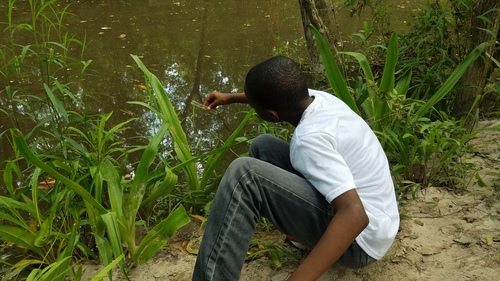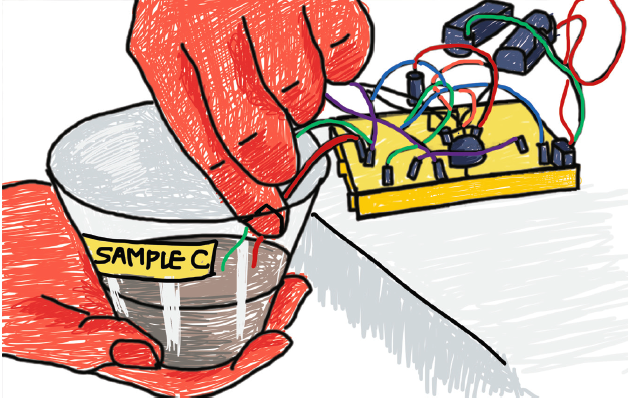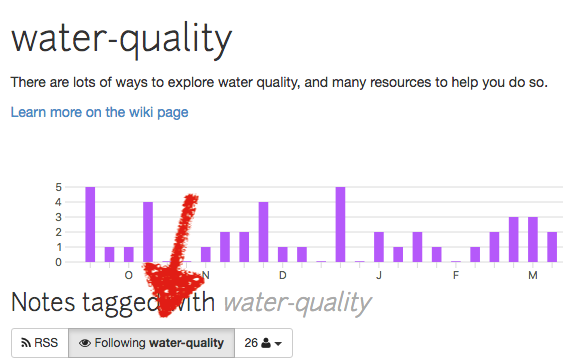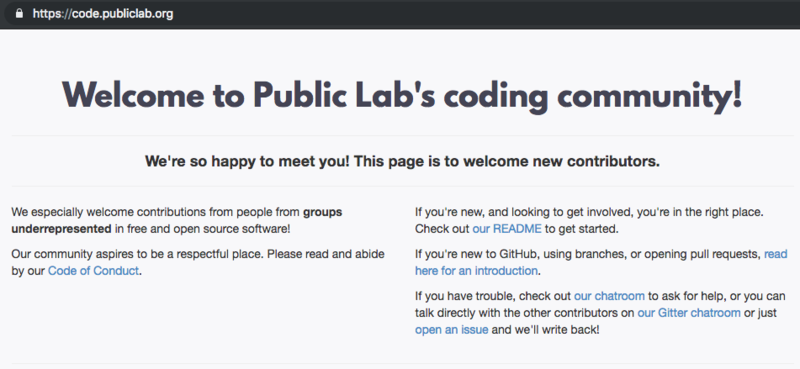The Public Lab Blog
stories from the Public Lab community
About the blog | Research | Methods

Project Advances Environmental Literacy on the Coasts
Public Lab is excited to work with the National Academies of Sciences, Engineering, and Medicine's Gulf Research Program to build the scientific capacity of the next generation. As one of nine projects selected, Public Lab will be working alongside other inspiring organizations to provide a variety of innovative learning opportunities for children and youth in coastal states including Alabama, Georgia, Louisiana, Maine, Mississippi, and Texas on a broad range of topics pertaining to community resilience and environmental health.
From the press release: "U.S. Gulf Coast communities face a convergence of environmental concerns with distinct social, cultural, economic, political, and regulatory factors that create complex situations many of these communities find themselves challenged to address. For this reason, the Gulf region is both a fitting and important place to foster youth to become civically-minded, scientifically literate members of society engaged in building more resilient communities."
The challenges facing the Gulf Coast will be inherited by youth of today and tomorrow. Inspiring environmentally impassioned youth is essential. In order to do so, we must build and harness students' ability to think about and address environmental stressors.
Our project engages youth in hands-on science learning and practice relevant to their lived experiences, with a community citizen science learning model that positions young people as knowledge producers rather than knowledge consumers. With teacher support, 12- to 18-year-old youth "will lead research projects through all research stages on local environmental topics they have identified as important. Materials developed and refined through the pilot effort will be made available for use by other educators throughout the region."
We've already seen how community citizen science programming can both educate and engage youth to identify environmental concerns, articulate complexities, develop research questions, and implement authentic and multi-faceted approaches engaging such challenges. We are excited by this, and the opportunity to work with educators and the Gulf Research Program to build out programming, and a community of practitioners ready to engage the students of today, and leaders of tomorrow.
To learn more or get involved, please visit https://publiclab.org/wiki/education.
"The National Academies of Sciences, Engineering, and Medicine are private, nonprofit institutions that provide independent, objective analysis and advice to the nation to solve complex problems and inform public policy decisions related to science, technology, and medicine. The Academies operate under an 1863 congressional charter to the National Academy of Sciences, signed by President Lincoln."
Follow related tags:
gulf-coast education youth blog

Educating a New Generation of Advocates
Go out into the wetlands. Find a quiet, secluded area. Be very quiet. Be still. After about a minute of silence, you'll start to hear birds. You'll hear the wind in the trees. You'll hear the water trickling. You'll see nature coming back to life.
This is how Howard Page helped share nature with a group of youths from the Forest Heights Boys and Girls Club in North Gulfport, Mississippi. "The kids really were amazed. It was remarkable that it could be one of the first times where some of these kids took the time to be truly quiet---an observer in nature, and not just stumbling through it," he says.
The children meet up after school at a center that backs up to the Turkey Creek Watershed, a popular waterway for canoeing and fishing, where Howard helped organize a series of workshops with students ages 10-15. "The idea was to have a series of experiences where the kids, in a very hands-on fashion, learned about the wetlands, but also learned about ways to do science, to do research, to document things, record, and report things," he shares. "We wanted to take them into their backyards, the wetlands, and give them fun, interesting ways to embrace and own the wetlands."
A Gulfport native, Howard grew up hunting and fishing in the area, with a love of the local coastal wetlands. Now as a community organizer with the North Gulfport Community Land Trust and Sierra Club, he's working with partners like Public Lab and the Gulf Restoration Network to teach kids to explore the wetlands through activities like balloon mapping, water testing, trekking, and photography.
"Everything was designed to be aspirational," says Howard. "I wanted the kids to not just learn science and how to fly balloons, but teach them that they can be educators too---and teaching them the jobs they can get by learning biology and chemistry. And that when they read these books about nature, they can write the books and take the photographs. We didn't want them to just meet professionals but wanted to make sure they knew they could become those professionals, and teach them what it would take to do that."
As a preservationist, taking science out of the classroom and into the field is important to Howard. "As a young person grows up in this community and gains an understanding of the wetlands, the goal is that in a few years, they'll be great voices for protecting them," he says. And the area can use all the advocates it can get. Development in Gulfport has led to a loss of wetlands, meaning a loss of vital flood protection. Stormwater control often fails to work properly, resulting in sewer and septic systems spilling untreated waste into the streets. "If there's untreated water rising up around your house, it may be out there where kids are walking and playing." He adds, "And aside from the obvious health related issues, there are psychological effects of constantly wondering 'Is my house going to flood and am I safe?'"
Howard has been closely involved with recent success with community efforts to protect local wetlands. "Because of community engagement, we've been able to identify areas where sewer systems leak into the wetlands, leading to better management practices," he shares. "One day, we hope to get these areas into conservation."
For now, Howard is helping to create a new generation of conservationists. "I asked the kids to go home and research what things live in the wetlands," he retells. "They came back the next week with answers. We talked about birds and snakes and cypress trees. And even moose! But there's one thing you're forgetting, I told them. You are one of the creatures that live in the wetlands. They really got a kick out of that."
Follow related tags:
gulf-coast balloon-mapping water-quality blog

Introducing the Coquí – it's a frog and a tool!
Have you heard of the Coquí? They are sonorous frogs from Puerto Rico, and the subject of an awesome Menudo video from the 1980s.

The Coquí is a Puerto Rican frog that makes a "CO" and then a "KEE" sound at night
The Coquí frogs (and sort of the Menudo video) were our inspiration for naming the Public Lab Coquí, an easy, do-it-yourself circuit that makes a buzz-buzzing sound when you dip it in water.

Illustration by Akshaya Sawant
The Coquí circuit measures conductivity, a key water quality parameter. Conductivity is a measure of how "conductive" water is of electricity. If water is very pure H2O then the conductivity will be low because electricity doesn't pass well through water. But if there is a lot of stuff other than water in the water -- like mud, chlorine, or salt -- then water conductivity will be higher. High conductivity is not always a "bad" thing -- lots of rivers carry organic material, for example. And likewise, low conductivity doesn't always correlate to good water quality. Water with a ton of sugar in it would show up as low conductivity because sugar also doesn't conduct electricity very well. That said, water conductivity is a generally interesting indicator for how much "not water" is in your water and can help you ask questions about what that "not water" might be.
The Coquí was developed by Don Blair and Jeff Warren along with the Open Water Project based at the Public Lab. It's designed to be used in educational settings, and it doesn't measure precise values for water conductivity. Rather, it outputs a conductivity measure as a sound. You dip the Coquí's probe into water and it makes a high-pitched sound for higher conductivity and a low-pitched sound for lower conductivity.
Video from Chelsea Tremblay's sensor journalism research note
So while it's not a tool for collecting precise scientific measurements (if you want that you might want to check out the Riffle or some of the data loggers available from KAPtery), the Coquí is a great tool for introducing newcomers to building circuits, water conductivity, and civic science. Here are the benefits:
- It's pretty cheap.
- Newcomers can build the circuit in less than 1 hour
- You can use it in educational modules where learners bring water samples to class and then measure their conductivity together
- You can use it to instigate conversations about civic science and water quality in your community
I teach data journalism and I have used the Coquí with my undergraduate journalism students to collect water samples from the community, test their conductivity, and then reflect on the role of journalists in regards to "sensors". Below is a map the students made of water conductivity in the Greater Boston area.
Water conductivity map made from samples the students collected around the Boston area
After running this module several times, I worked with graduate student Akshaya Sawant to create a free, illustrated guide to running a sensor journalism workshop. You can use this to help you get started using the Coquí inside or outside the classroom.

The Sensor Journalism Guide for Educators uses the Coquí to walk journalists and storytellers through an exercise in sensor journalism.
The Coquí kit is available from the public lab store. If you use it in the classroom or workshops, we want to hear about it! Post your research notes or ask a question and use the tags "Coquí" and "water-quality".
More Resources:
- Buy the Coquí
- Download the Sensor Journalism Educator's Guide, or purchase it in the Public Lab Store
- The Coquí's wiki page on Public Lab
Catherine D'Ignazio is an organizer with Public Lab and an assistant professor of Civic Media and Data Visualization in the Journalism Department at Emerson College. Learn more about her work at www.kanarinka.com.
Follow related tags:
education kits water-quality blog

Introducing Pi Builder
The Public Lab Kits Initiative uses Raspberry Pi cameras more and more, and was in need of a workflow to generate customized operating system images for specific needs such as the Microscope and Lego Spectrometer Kits.
In general, while Raspberry Pi mini-computer boards are amazing, there's a significant barrier for many people to use them, which is the installation and configuration of the memory card with useful software -- like camera software, for example!
Plug and play
We wanted to have a way to generate different pre-loaded SD cards, repeatably and reliably, for different uses. And we wanted people to be able to simply insert an SD card, plug in the camera and power, and start using the Raspberry Pi as a camera as quickly as possible.
We also had a desire to build a process whereby the community could participate in the construction of the operating system that we distribute with our kits and also to share recipes and ready-made images for usage in specific scenarios.
The default operating system image is meant to simplify the workflow for kit users, so these well-defined features needed to be set up:
- A WiFi hotspot with a _captive portal _(like airport WiFi) so you are prompted as soon as you connect
- A streaming web camera application
- Ability to run scripts (e.g. Timelapse)
- A friendly landing page with links to the above
I was contracted for this and so I had to come up with great shoulders to stand on in order to deliver all features! Disclosure: I am also Public Lab's part time Systems Administrator.
Fortunately thanks to the great work of the Hypriot Project, and the Gitlab CI service, we are able to iterate quickly and collaboratively, from an orderly and flexible base.
Please consider this release a Beta to try out
Download
☁️ Download latest combined image
Documentation
The documentation is included with the combined image. You may also read it online.
We also have a page for Q&A, troubleshooting, and activity guides here.
Contributing
Adding a new "recipe" is quite easy -- it is possible to fork our repository, make your modifications and open a pull request, which our system will use to generate a new custom image. You can then download a fully built customized image ready to be burnt into your Pi¹.
¹: Tested on Pi Zero W only.
We'll be thrilled to see this repository evolve in alignment with the communities's needs.
Follow related tags:
raspberry-pi blog raspbian with:warren

Reply-by-email: a new way to use PublicLab.org
Today we're announcing a new feature you may have noticed over the past few weeks! For a long time, emails about new posts or comments on PublicLab.org have been from an address called do-not-reply@publiclab.org -- how unfriendly! But it's because, unlike a mailing list, you couldn't just write a reply email. Remember this?
Now you can reply by email!
Thanks to amazing work by a number of Google Summer of Code fellows (#soc), but primarily by Naman Gupta, you can now just write back a reply email, as long as you're sending from the same email you're signed up with. (log in and check this here)
(This will work for any email you get from notifications@publiclab.org that has a post id in the subject line, like this: Title of the email (#1234) -- that's most of them!)
It's a new feature, so give it a try, and report back if you have any trouble!
Looking ahead
This means that, soon enough, we will be relying more on the PublicLab.org website as a forum, rather than on our old Google Groups. To stay in touch with others working on topics you care about, be sure to SUBSCRIBE using the many prompts on the site, for example at the top of any topic page (linked to from your dashboard, or the front of PublicLab.org!):

Lots of changes & activity
You may have noticed a lot of changes on PublicLab.org recently -- this has been made possible by a dramatically growing community of software contributors, joining us through our new coding Welcome Page at code.publiclab.org, as well as through programs like Rails Girls, Outreachy, Google Summer of Code and Google Code-In -- and with support from the DIAL Open Source Center and the Schmidt Foundation's 11th Hour Project.
Hundreds of new people (see the bottom of code.publiclab.org) have started showing up to help fix bugs, implement new features, and help others in turn join in our efforts -- a very Public Lab spirit! And we've made serious efforts to reach out to and welcome members of groups that are under-represented in open source. You can read about our outreach work here. The result is that the collaboration systems we use across this community are getting refined and improved faster than ever!

Our code contributor community is built on a commitment to mutual benefit -- we can't create good software without welcoming in newcomers, and we are deeply invested in supporting contributors to learn new skills and grow as coders, designers, project leaders, and "cooperators". Unlike many open source communities, much of our capacity is aimed at helping people become proficient coders, and to learn and apply new skills.
But we also seek to change coding culture by recognizing how important communication, mutual support, and affirmative and welcoming tone are. As part of this, we seek to improve ourselves and help contributors learn how to support one another, welcome in a diverse and inclusive community, and build a more positive and equitable society by doing things a little differently.
Follow related tags:
community gsoc blog code

Introducing a new Privacy Policy for Public Lab
At the Public Lab non-profit, we are committed to the ethical and respectful use of personal information. In our work, and to serve our community and those we work with, we need to make use of personal information in a number of ways. We always seek to protect individual privacy while we fulfill our responsibilities and mission, and when these must be balanced, we seek to do so transparently and in good faith.
As part of this commitment, but also as part of our response to the new General Data Protection Regulation in Europe, today we are publishing a privacy policy which will cover all Public Lab websites and handling of personal data.
We've done our best to explain things in plain language, and as thoroughly as possible, even providing new information on IP-address anonymization at a supporting page here: https://publiclab.org/wiki/location-privacy#Privacy+Policy+Location
Most of it affects only those people who sign up and create an account on PublicLab.org, attend an event, or otherwise interact actively with Public Lab websites and systems.
Finally, it's been our intent in this document to explain why we handle different kinds of data in order to fulfill our role hosting these spaces and fulfilling the Public Lab mission.
Please give it a look -- thank you!
Follow related tags:
blog privacy privacy-policy gdpr